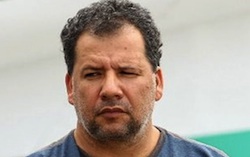Colombia’s President Juan Manuel Santos has signed the order that will send drug trafficker and former paramilitary chief Daniel Rendon Herrera, alias “Don Mario,” to the US, following a drawn out case that has raised questions relevant to the current peace process with the FARC guerrillas.
Don Mario is wanted by the Southern District Court of New York for conspiring to traffic drugs and supporting a terrorist organization — demobilized right-wing paramilitary umbrella group the United Self-Defense Forces of Colombia (AUC).
He is a prominent figure in Colombia’s conflict who worked for the leaders of the AUC before founding his own criminal organization, following his demobilization in 2006.
Santos’ signing of Don Mario’s extradition order followed years of legal wrangling. In 2010, Colombia’s Supreme Court ruled that Don Mario could not be extradited until he had participated in the country’s reparations process, under the terms of the Justice and Peace Law. The process guarantees paramilitaries a certain degree of amnesty in exchange for testimony about the conflict.
Don Mario did not disappoint. As Verdad Abierta details, he told the Justice and Peace court about the Colombian military’s collaboration with the paramilitaries, and described the backing that some AUC leaders provided to political campaigns.
But he also admitted that after formally laying down his arms in 2006, he continued his involvement in trafficking drugs and other crimes, until his arrest in 2009. Last year, the Justice and Peace court ruled that because of this, he was ineligible for the benefits provided under the demobilization law.
The drug trafficking organization established by Don Mario, the Urabeños, went on to become the most powerful criminal group in Colombia, as detailed in a special investigation by InSight Crime.
InSight Crime Analysis
Don Mario’s fate echoes that of 14 top paramilitary commanders who were extradited to the US in a surprise move in 2008, after former President Alvaro Uribe claimed they had failed to cooperate with the peace process. However, in contrast to this group of paramilitary leaders, Don Mario provided more information about his criminal networks and his crimes. His extradition may provoke arguments from victims of the conflict and others that sending him to the US to be tried for drug trafficking will inhibit efforts to further investigate crimes against humanity that the paramilitaries committed in Colombia.
SEE ALSO: AUC News and Profile
This is the type of uncomfortable trade-off that Colombia’s political system is now considering with rebel group the Revolutionary Armed Forces of Colombia (FARC), who have been in peace talks with the government since 2012. Many top FARC commanders are wanted in the US for drug trafficking, and are unlikely to agree to a peace deal unless the government can assure them they won’t meet a fate like Don Mario’s. As with the paramilitaries, the question of how to address the FARC’s drug-related activities has provoked significant debate in Colombia.

